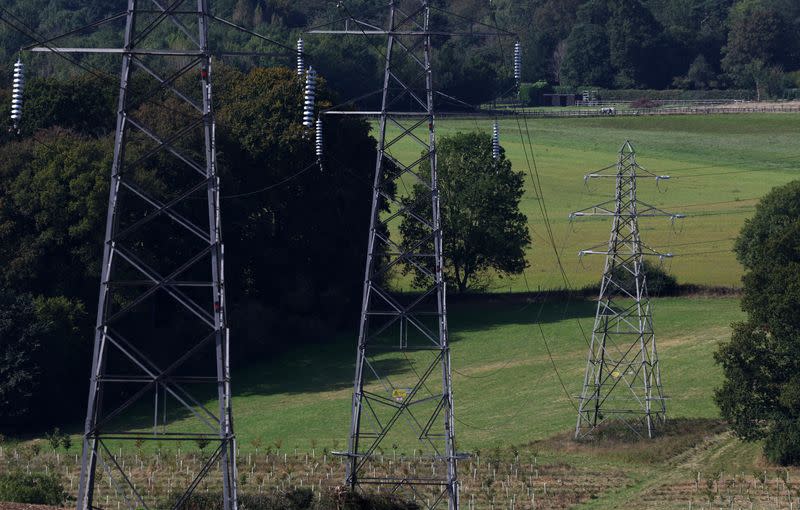Battle over power pylons highlights Britain's net zero challenge

By Elizabeth Piper
WAVENEY VALLEY, England (Reuters) - Dot Matthie says she faces losing the use of the airstrip in her field because of a British government plan to build electricity pylons in the area, which would put light aircraft in danger.
Will Gaze fears losing half of a field growing arable crops. Christine Murton says she sold her house at a big loss because of the scheme.
All three are part of an eclectic group of campaigners in the Waveney Valley and nearby areas in England's East Anglia region fighting plans for high-voltage lines to carry wind and solar power across the rolling fields towards UK cities - part of the government's strategy to reach net zero emissions by 2050.
The group is not opposed to green policies - most support the energy transition. But they object to 50 metre-high pylons being built in farmers' fields, among the thatched cottages and winding lanes of villages, and in private gardens.
And they are threatening legal action if the proposals do not change.
Instead they want an offshore grid or cables underground, using new High Voltage Direct Current technology (HVDC).
That would cost more, underscoring the challenge Britain's next government faces to build power infrastructure at a rate not seen in decades, at an affordable cost and without losing public support.
"It's not green to actually bombard your way through precious woodlands and hedgerows," said Murton. She said she sold her house in Waveney Valley as soon as she saw plans for two pylons to straddle her land with lines "straight across my back garden".
She sold at a 300,000 pound ($375,000) loss, she said. Reuters was unable to confirm that independently.
Britain was a pioneer in offshore wind, with major farms built along its east coast. But as demand for electricity increases, the drive to build more pylons to carry power to London and elsewhere is being met with local opposition, legal challenges and planning delays.
Last year, the National Infrastructure Commission said the rate of large-scale projects being subjected to judicial review had hit 58% in recent years, from a long-term average of 10%.
GREEN ENERGY PROMISE
National Grid plans to build a new 180 km, 400,000-volt electricity transmission line between Norwich in Norfolk and Tilbury in neighbouring Essex to provide clean energy for six million buildings. It's part of a plan to connect 50 GW of offshore wind by 2030.
The grid is consulting on options in the Waveney Valley after receiving complaints. But it says that underground cables would cost more and that would need to be paid for by residents. The local campaigners say that they would pay higher bills to protect their communities.
The campaigners are gearing up for a "planning battle", assembling experts to argue that the project consultation was flawed and the Grid failed to consider alternatives.
"We've got heritage consultants, landscape consultants, soil consultants, environmental consultants," said Rosie Pearson, founder of the campaign group "Pylons East Anglia". "So they're all looking at the methodology, and the findings of National Grid and where there are gaps."
The grid says it has reviewed all options for the line and must opt for the most cost effective. It says an offshore grid using HVDC cables with the same capacity would cost almost 4.1 billion pounds, while pylons would cost around 895 million pounds ($1.1 billion) - a figure disputed by campaigners as too low.
With the legal challenges being replicated nationwide, the progress towards net zero has become intensely political, and is featuring in the campaign for a general election on July 4.
Richard Rout, the Conservative party's parliamentary candidate for Waveney Valley and the former deputy leader of Suffolk County Council, wants the power lines underground or offshore. But the Conservative national government favours pylons, in general.
Rachel Reeves, finance policy chief of the opposition Labour Party, which looks set to win the July 4 election according to polls, backed the Grid's proposals when she visited Norfolk in March, according to the local Eastern Daily Press.
"We've got to crack on and build the energy infrastructure to heat our homes and get people's bills down," she said.
Geoff Lazell, one of the campaigners, rejected the moniker of NIMBYs - those arguing "not in my back yard" at the prospect of new building. He said they were NOBYs - "in no one's back yard".
"The price to pay is not acceptable," he said.
(This story has been corrected to fix a typo in paragraph 17)
($1 = 0.7967 pounds)
(Reporting by Elizabeth Piper; Editing by Daniel Flynn)

